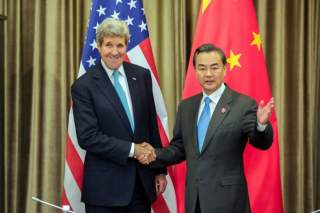Tale of the Tape: Comparing Chinese and American Strategies in Asia
"The CCP would have a tough time competing with a U.S. that once again takes primacy in Asia seriously. Indeed, if Washington locks in a favorable balance of power it may even start to see some cooperation from Beijing."
Regarding Tibet, China remains highly sensitive to other nation’s interactions with the exiled Dalai Lama, and Tibetans are resisting China’s imperial policies. Taiwan’s de facto independence continues to present a contradiction for Beijing’s “One China” principle. Beijing reneged on its agreement to allow free 2017 elections in Hong Kong, sparking large-scale protests. The CCP’s imperial control is more challenging. At the same time, middle class cynicism about corruption is growing and wealth is leaving China.
Conclusions: What does the balance of power look like?
China has made great strides in its coercive regional strategy and its counter-intervention strategy. It is forcing a response by the United States to regain its primacy. But the U.S. has not demonstrated the political wherewithal to resource its response.
However, China’s gains and the U.S. slow-footed response is not the whole story. The CCP’s grand strategy also includes continued economic growth that is increasingly reliant upon maritime trade. Becoming a true maritime power is very expensive, and China faces hostile powers along its periphery. Finally, China’s main weakness is its tenuous political legitimacy. It is ruling over an increasingly restive empire with aspirational citizens demanding more liberty and justice. The CCP has to spend enormous resources on imperial control and domestic security.
The U.S. has structural advantages over China such as greater wealth and a system of partners and allies. But can the president lead a bipartisan coalition at home ready to translate the nation’s advantages into a well-resourced strategy that retains U.S. primacy? The CCP would have a tough time competing with a U.S. that once again takes primacy in Asia seriously. Indeed, if Washington locks in a favorable balance of power it may even start to see some cooperation from Beijing.
[1] The article borrows from Barry Posen’s “Command of the Commons: The Military Foundation of U.S. Primacy” (International Security, Summer 2003) and Dan Blumenthal’s “The U.S. Response to China’s Military Modernization,” published in Strategic Asia 2012-2013.
Dan Blumenthal is Director of Asian Studies and a resident fellow at the American Enterprise Institute.
Eddie Linczer is an Asian Studies Research Assistant at the American Enterprise Institute.
Image: U.S. State Department Flickr.

